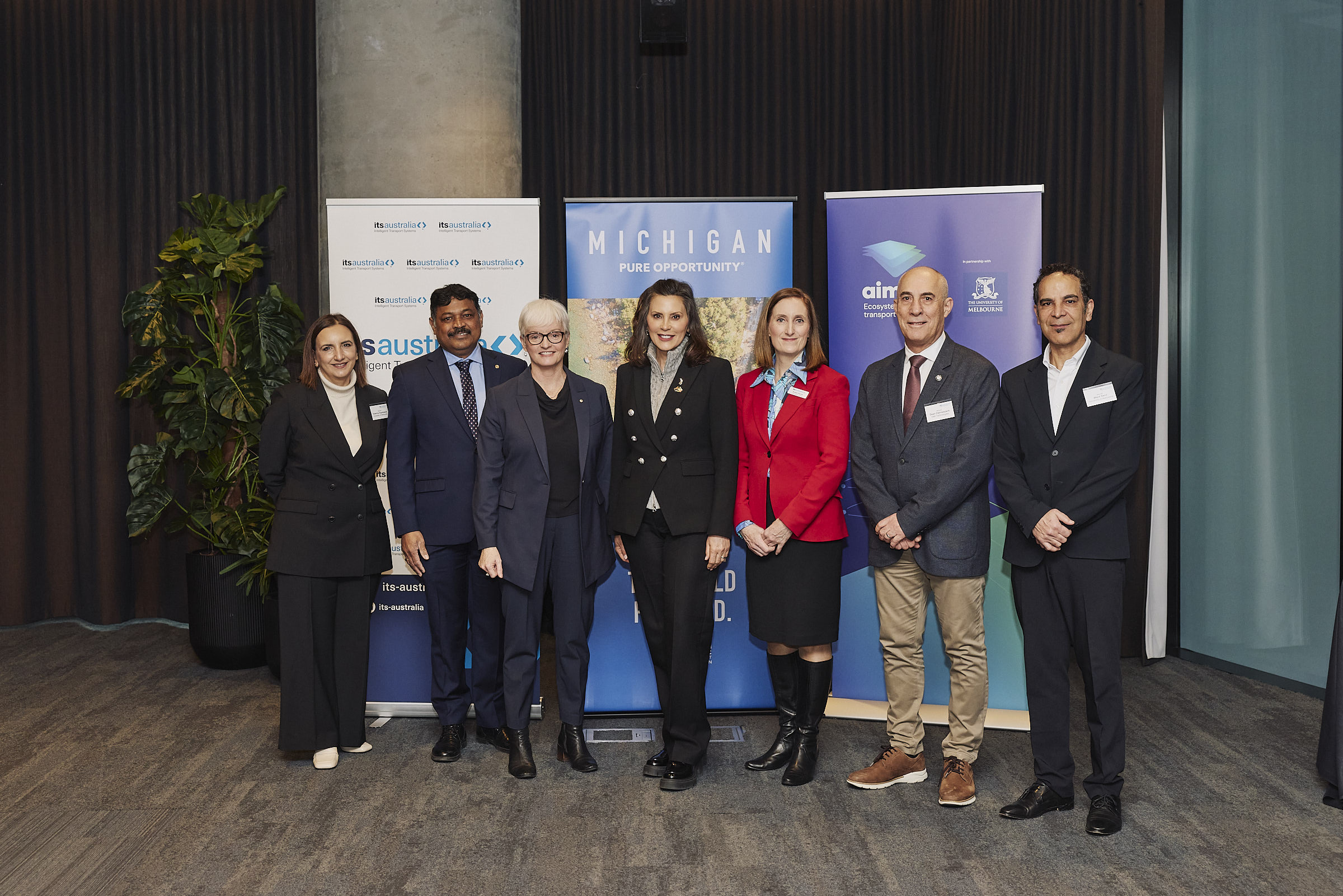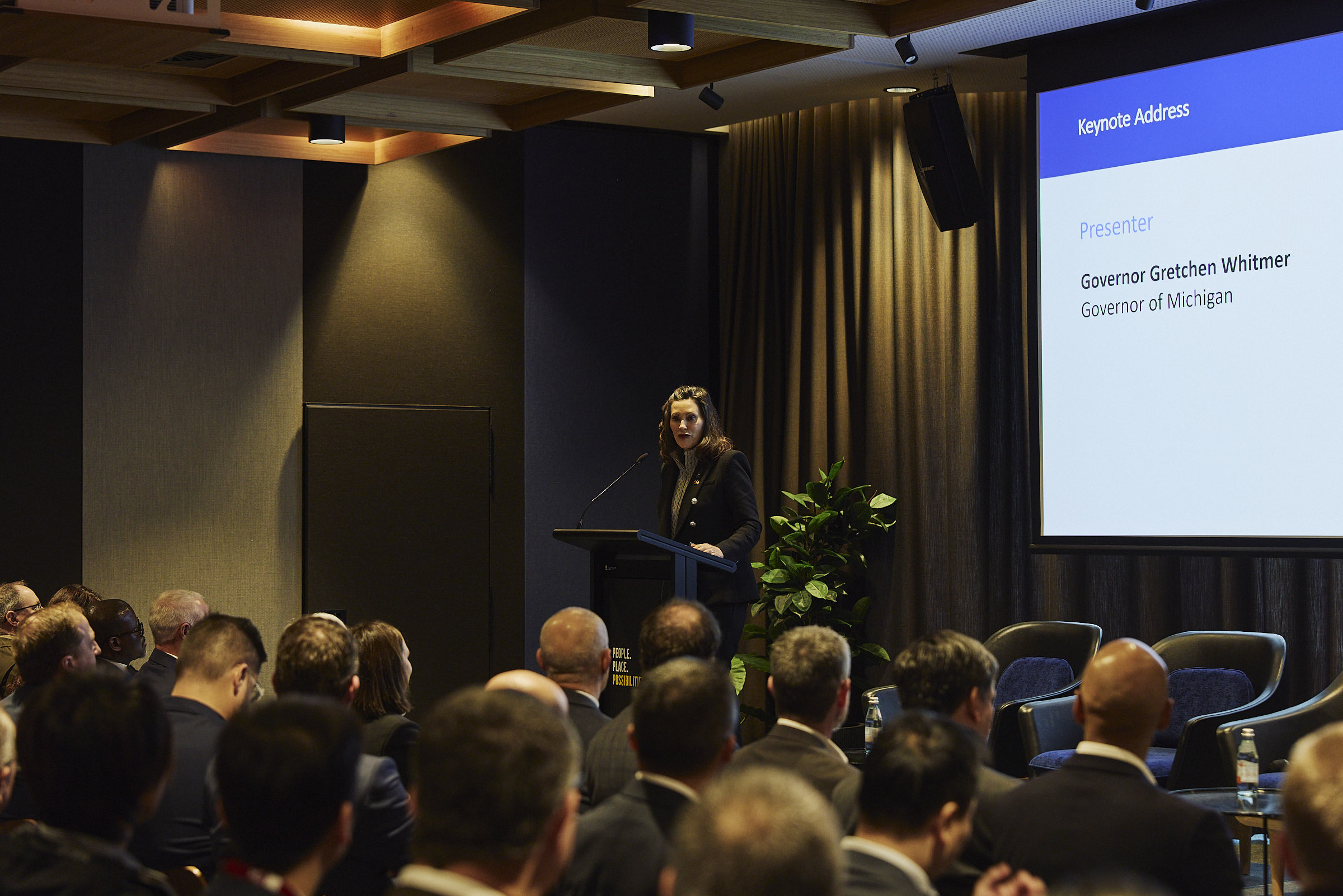20 June 2025
The Michigan Australia Exchange (MAX) Roundtable Report

The Michigan Australia Exchange (MAX) roundtable held this week at Melbourne Connect campus at the University of Melbourne and hosted by ITS Australia, highlighted the power of collaboration between government, industry, and academia to address some of the most pressing issues in transportation, chief among them; road safety, congestion, and the transition to zero-emissions mobility.
With over 1,500 road deaths annually in Australia and New Zealand, and more than 40,000 in the US, the event spotlighted how innovation and shared learning can help reverse stagnating road toll reductions. The exchange brought together senior leaders from Michigan and Australia to share insights on automation, connected vehicles, emissions reduction, and digital transformation.
Michigan Governor Gretchen Whitmer opened the event, noting Michigan’s role as a global mobility leader with 40,000 automative jobs including electric vehicles and battery manufacturing, and a proud legacy of innovation. “We put the world on wheels,” she said, emphasising the state’s commitment to building future mobility partnerships through the Australian and Michigan Government continued commitment to the Memorandum of Understanding signed in 2018.
Australian transport leaders, including Mike Makin from the federal Department of Infrastructure and Michael Hopkins CEO of the National Transport Commission, highlighted the complexity of Australia’s federated system. They shared progress on the Connected and Automated Vehicle (CAV) Action Plan and new national vehicle efficiency standards, which take effect 1 July. Harmonising state laws and enabling safe CAV deployment are key priorities with the states and federal governments working to ensure cross-border harmonisation of these technologies.
Victoria's Anna Hardie and AIMES Director Majid Sarvi detailed local projects demonstrating how physical infrastructure is being digitally transformed and with congestion in Melbourne being near on par with Los Angeles this is critical work. A live testbed in Melbourne, featuring 60 connected vehicles and 90 technologies, is delivering real-time alerts on roadworks, speed limits, and intersection hazards. North-East Link investments, rail expansions, and smarter bus corridors all reflect a move toward integrated, inclusive, and data-driven mobility.
Michigan transport officials also shared their evolving mission, from building roads to enabling people. Brad Wieferich of the Michigan Department of Transportation highlighted new challenges of distracted drivers and how technology can be deployed to make a difference, cross-border freight initiatives with Canada, and the CAVenues project, which provides dedicated lanes for Level 2-4 automated vehicles. Michigan is also expanding drone use cases, from medical deliveries to water sampling.
Justine Johnson, Michigan’s Chief Mobility Officer, invited Australian companies to apply for the more than $90 million USD in mobility grants provided through the Michigan Economic Development Cooperation to prototype and scale their innovations. "Mobility is anything that uses clean energy to move people, products, and ideas,” she said. Reinforcing Michigan’s place in the annals of transport history and describing why one quarter of the Michigan economy comes from the automotive industry;
- 1908 – Henry Ford introduces the Model T
- 1910 – First mile of concrete roadway rolled out
- 1920 – Detroit city police officer created a four-way traffic signal
- 2020 – Governor Whitmer created the Office of Future Mobility
Academic leaders from the University of Michigan and Michigan State University presented cutting-edge research including digital twin testbeds, driver behaviour studies, and real-world smart intersection deployments. Karen Thole of UM noted that only 13% of drivers currently trust Avs, making public trust and safety validation core to ongoing work.
The MAX event reaffirmed the value of cross-border collaboration in shaping a transport future that is safer, cleaner, and more connected. As Professor John Papapolymerou of Michigan State put it, "Democratising access to education and innovation is how we solve real problems -- not just for one country, but for the world."
